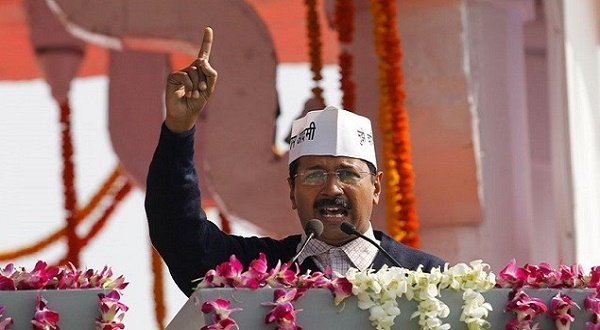
If Kejriwal succeeds in delivering on his promises in Delhi, he will make Modi’s task all the more difficult
A G NOORANI
[dropcap]P[/dropcap]RIME Minister Modi’s spell of electoral victories was not going to last long. Yet, none could have predicted that it would halt in the nation’s capital in a humiliating defeat at the hands of a party he had dismissed contemptuously, the Aam Aadmi Party (AAP) headed by Arvind Kejriwal. It won nearly all the seats in Delhi’s 70-member assembly conceding only three to the Bharatiya Janata Party (BJP).
Desperate attempts have been made by Modi’s supporters, especially those in the media, to prove that it was not his personal defeat. That will not wash. He had established tight control over the BJP, reducing it to his praetorian guard. Old hands like L.K. Advani and Murli Manohar Joshi were sidelined. Amit Shah, Modi’s Man Friday in Gujarat, was made BJP president.
His sole qualification was that he had crafted the strategy that won Modi a resounding victory in the Lok Sabha polls last May. That the AAP won a mere four seats (none in Delhi) then speaks for its skill in bouncing back. Kejriwal had blotted his record by resigning as chief minister after 49 days in power.
It is not surprising that Delhi’s Muslims voted for AAP.
Modi campaigned in Delhi exerting his clout as prime minister. The language he used was coarse. In contrast, Kejriwal eschewed negative campaigning and concentrated on the issues that matter to the common people.
Defeat provokes recrimination. The Rashtriya Swayamsevak Sangh’s (RSS) Organiser was the first to pinpoint faults in the BJP’s strategy. But the rank and file has not lagged behind.
Veteran Delhi loyalist Dr Harsh Vardan was ignored. A former police officer, the flamboyant Kiran Bedi, a recent entrant, was imposed as the BJP’s candidate for the office of chief minister. She lost. Party activists blame Amit Shah for the flawed strategy. This is the beginning of the end of the honeymoon which Modi has enjoyed.
That he has failed to deliver on his promises was widely noted. So was his penchant for banalities in word and showmanship in conduct. His studied silence on the outrageous attacks on the minorities by the Sangh Parivar drew international attention — not least because this time Christians were also targeted. This forced Modi to speak up.
The New York Times censured him more than once. American opinion has always counted for a lot in BJP councils. “What will it take for Prime Minister Modi to speak out about the mounting violence against India’s religious minorities … Mr Modi’s continued silence before such troubling intolerance increasingly gives the impression that he either cannot or does not wish to control the fringe elements of the Hindu nationalist right.”
Such criticism misses the wood for the trees. Modi has radically changed the nation’s ambience by a series of administrative measures inspired by two common aims — promotion of political supporters and the Hindutva cause. Small wonder that the Muslims of Delhi flocked to vote for the AAP.
What the results did was to rob him of his aura of invincibility and relative immunity from criticism. Demands for performance will become stronger. The battle to secure Bihar which goes to the polls next year and Uttar Pradesh which follows suit in 2017, will be that much harder to win. And the BJP’s parental monitor, the RSS, will be far less tolerant. The Modi bandwagon has been abruptly stopped, which none had expected.
That raises a vital issue affecting the BJP’s fortunes in the future. Way back in 1980 when the BJP was established, Advani said that as a party’s following spreads, its ideology gets “diluted”. The BJP followed this route and failed.
In 1992, it decided to revive the Hindutva ideology with demolition of the Babri Masjid as a plank. All it secured was power in a ramshackle coalition. In 2014, Modi left Hindutva unsaid. He fought the election on the plank of ‘development’. The people have now begun to demand performance.
That will be a big challenge since he diminished ministers to hold all the levers of power himself. The significance of the Delhi elections is that they mark a watershed between invincibility after the Lok Sabha polls and accountability hereafter. The gimmicks of old will not work.
However, two factors must be reckoned with. One is the possibility of the revival of a Congress in decay. The other is the AAP’s performance. Kejriwal seems determined to perform. On Feb 14, as he took oath of office, he said: “I have been hearing on television channels that some of us are saying that we will contest elections here and there, in five states or 10 states. This reeks of arrogance and I think it is not right.”
If he succeeds in delivering on his promises in Delhi, he will make Modi’s task all the more difficult. He now has a prestigious platform from which to hurl challenges at Modi.–Dawn

